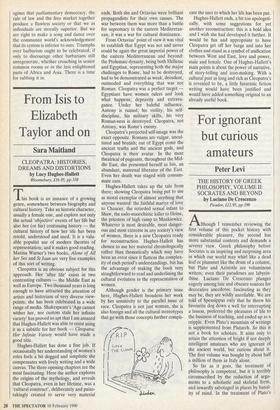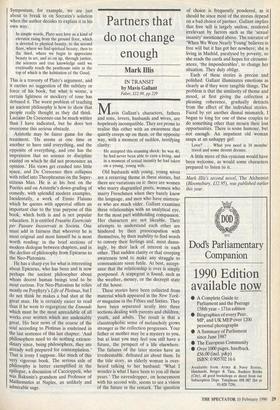For ignorant but curious amateurs
Peter Levi
THE HISTORY OF GREEK PHILOSOPHY, VOLUME II: SOCRATES AND BEYOND by Luciano De Crescenzo
Picador, £12.95, pp.190
Although I remember reviewing the first volume of this pocket history with considerable pleasure, the second has more substantial contents and demands a severer view. Greek philosophy before Socrates is an inspiring and surprising area in which our world may whirl like a dead leaf or plummet like the drum of a column, but Plato and Aristotle are voluminous writers; even their paradoxes are labyrin- thine. Luciano De Crescenzo plunges eagerly among late and obscure sources for decorative anecdotes: fascinating as they may be, they are wildly unreliable. We are told of Speusippus only that he threw his favourite dog down a well for interrupting a lesson, preferred the pleasures of life to the business of teaching, and ended up as a cripple. Even Plato's mountain of writings is supplemented from Plutarch. So this is not a book for scholars. It aims only to retain the attention of bright if not deeply intelligent amateurs who are ignorant of the ancient world, but curious about it. The first volume was bought by about half a million of them in Italy alone.
So far as it goes, the treatment of philosophy is competent, but it is terribly circumscribed by the reduction of argu- ments to a scholastic and skeletal form, and inwardly sabotaged in places by banal- ity of mind. In the treatment of Plato's Symposium, for example, we are just about to break in on Socrates's solution when the author decides to explain it in his own way.
In simple words, Plato sees love as a kind of elevator rising from the ground floor, which is devoted to physical beauty, to the second floor, where we find spiritual beauty, then to the third, where we begin to appreciate beauty in art, and so on up, through justice, the sciences and true knowledge until we eventually reach the penthouse suite at the top of which is the habitation of the Good.
This is a travesty of Plato's argument, and it carries no suggestion of the subtlety or force of his book, but what is worse, a certain lightness or mockery of tone has debased it. The worst problem of teaching an ancient philosophy is how to show that people really thought as they did think. Luciano De Crescenzo can be much wittier than I have indicated, but he does 'not overcome this serious obstacle.
Aristotle may be fairer game for the treatment. 'He seems at one time or another to have said everything, and the opposite of everything, and one has the impression that no science or discipline existed on which he did not pronounce an opinion.' His views get crushed into little space, and De Crescenzo then collapses with relief into Theophrastus on the Super- stitious Man. He is at his best on the Poetics and on Aristotle's down-grading of comedy, with splendid modern examples. Incidentally, a work of Ennio Flaiano which he quotes with approval offers an important clue to the true purpose of this book, which both is and is not popular education. It is entitled Frasario Essenziale per Passare Inosservad in Sodeta. One must add in fairness that wherever he is most original and most himself he is most worth reading: in the brief sections of modern dialogue between chapters, and in the decline of philosophy from Epicurus to the Neo-Platonists.
He has a sharp eye for what is interesting about Epicurus, who has been and is now perhaps the ancient philosopher about whom decent human beings tend to be most curious. For Neo-Platonism he relies mostly on Porphyry's Life of Plotinus, but I do not think he makes a bad shot at the great man. He is certainly easier to read than if he were to regurgitate the Enneads which must be the most unreadable of all works ever written which are undeniably great. His best news of the course of the soul according to Plotinus is enshrined in the last sentence of this last chapter: 'And philosophers need to do nothing extraor- dinary since, being philosophers, they are already well prepared for contemplation.' That is irony I suppose, like much of this very vigorous book. The serious side of philosophy is better exemplified in the epilogue, a discussion of Caccioppoli, who was Bakunin's grandson and Professor of Mathematics at Naples, an unlikely and admirable sage.



















































 Previous page
Previous page